 It is nothing short of reckless, from the perspective of national security, to allow any individual or private corporation to maintain monopoly ownership and control over a global Internet satellite communications system.
It is nothing short of reckless, from the perspective of national security, to allow any individual or private corporation to maintain monopoly ownership and control over a global Internet satellite communications system.
Nonetheless, today, courtesy of launch licenses issued by the Federal Aviation Agency (FAA), the world's richest man, Elon Musk --- net worth $273.5 billion --- has amassed monopoly control via Starlink, a global Internet communication system that owns and operates more than 6,300 satellites.
Haven't we --- almost literally --- seen this movie before? And does it ever end well?
The scope of this non-fictional threat is by no means confined to the enormity of Musk's wealth. As The Atlantic's Marina Koren astutely observed in "Elon Musk Has the 'Off Switch'", the combination of ownership and control over X (formerly Twitter) and Starlink has enabled Musk to wield "unprecedented power." And we've already experienced an instance in which Musk, who reportedly "regularly communicates" with the Russian dictator, Vladimir Putin, has utilized that "unprecedented power" to undermine a core component of U.S. foreign policy...
In September 2023 --- three months after the Pentagon purchased Starlink terminals for use in Ukraine --- Musk abruptly "cut-off" Ukraine's access to the system; thwarting a Ukrainian drone attack on Russian warships. According to ABC News, Putin also "asked the billionaire to avoid activating his Starlink satellite internet service over Taiwan as a favor to Chinese leader Xi Jinping."
In a follow-up, Nina Golgowski at the Huffington Post reported that Musk is "dually involved in classified intelligence contracts with the U.S. government." According to Golgowski, NASA Administrator Bill Nelson, who called for an investigation, believes the Musk/Putin contacts "would be concerning, particularly for NASA, the Department of Defense, [and] for some of the intelligence agencies."
A provision of the Electronic Code of Federal Aviation, 14 CFR §415.2, authorizes the FAA to withhold a license to launch based upon national security concerns. Accordingly, the FAA "can suspend or revoke" a license to engage in commercial space activities. Vital national security interests mandate nothing less than a revocation of Starlink's licenses to launch. This must be coupled with a fair market value confiscation/nationalization of the entire Starlink global Internet satellite communications system.
As noted, the threat to national security is not confined to Musk and Starlink. To appreciate the need for legislative reform to protect national security, it is perhaps useful to review how we arrived at the absurdity of one obscenely wealthy individual gaining monopoly control over a global Internet system that owns and operates more than 6,300 satellites.
At its outset, the Space Race entailed a competition between nations --- principally the U.S. and the USSR --- as reflected in the passage of the National Aeronautics and Space Act of 1958. That Act established that the U.S. government would control space exploration to ensure peaceful activities. But, as attorney Kelsey Evanson observed last year in a Houston Law Review Article, "Billionaires Eclipse NASA", the need for governmental control clashed with recognition that "reservoirs of great wealth sit untapped in space."
Where 25.8 billion U.S. taxpayer dollars (318 billion in 2023 dollars) were spent between 1960 and 1973 to carry out President John F. Kennedy's determination to go to the moon, an FAA historical account [PDF] reflects the ensuing push to develop and profit from a privatized "Commercial Space Industry".
The first successful private space launch took place in 1982. In 1983, President Ronald Reagan issued a National Security Directive (NSDD 94 - Commercialization of Expendable Launch Vehicles [PDF]). The following year, Reagan signed into law the Commercial Space Launch Act of 1984. The get rich scheme to exploit the untapped "reservoirs of great wealth" was thereby unleashed.
While a number of competing billionaires have sought to exploit those untapped "reservoirs of great wealth", none have been more successful than Elon Musk, whose company, SpaceX, has received at least $15.3 billion from the U.S. government since 2003.
There's certainly room to debate whether privatization of what had been a government run enterprise (space travel) is economically sound. However, from a national security perspective, there's a major difference between allowing a privately owned company, like Jeff Bezos' Blue Origin, to transport NASA astronauts to the moon and back for $3.4 billion, and licensing Starlink, a division of SpaceX, to launch more than 6,300 telecommunications satellites that enable one man, Elon Musk, to exercise a core U.S. government function --maintenance and control of a global Internet satellite system that is needed for the effectiveness of U.S. and allied militaries.
Thus, it will not be enough to revoke Musk's license to own and operate Starlink. The Commercial Space Launch Act should be amended to ensure that the launch of all communication satellites and control of their use is left in the hands of the U.S. government.
 Ernest A. Canning is a retired attorney, author, and Vietnam Veteran (4th Infantry, Central Highlands 1968). He previously served as a Senior Advisor to Veterans For Bernie. Canning has been a member of the California state bar since 1977. In addition to a juris doctor, he has received both undergraduate and graduate degrees in political science. Follow him on Twitter: @cann4ing
Ernest A. Canning is a retired attorney, author, and Vietnam Veteran (4th Infantry, Central Highlands 1968). He previously served as a Senior Advisor to Veterans For Bernie. Canning has been a member of the California state bar since 1977. In addition to a juris doctor, he has received both undergraduate and graduate degrees in political science. Follow him on Twitter: @cann4ing


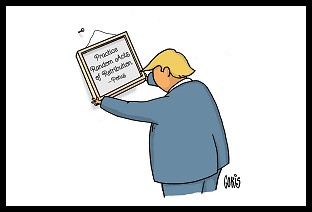 Sunday 'Random Acts of' Toons
Sunday 'Random Acts of' Toons From CA's 'Nuclear Deterrence' Map to Newsom's Trolling to Trump's 'Fascist Theatre' and Beyond: 'BradCast' 8/21/25
From CA's 'Nuclear Deterrence' Map to Newsom's Trolling to Trump's 'Fascist Theatre' and Beyond: 'BradCast' 8/21/25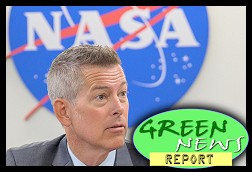 'Green News Report' 8/21/25
'Green News Report' 8/21/25
 On 'Americanism' and Trump's 'Stalinesque' Plot to Whitewash U.S. History: 'BradCast' 8/20/25
On 'Americanism' and Trump's 'Stalinesque' Plot to Whitewash U.S. History: 'BradCast' 8/20/25 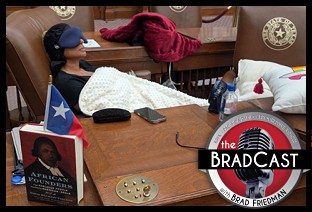 Texas GOP Imprisons Dem State Lawmaker in State House Chamber: 'BradCast' 8/19/25
Texas GOP Imprisons Dem State Lawmaker in State House Chamber: 'BradCast' 8/19/25 'Green News Report' 8/19/25
'Green News Report' 8/19/25 Trump, Nazis and
Trump, Nazis and  Sunday '
Sunday '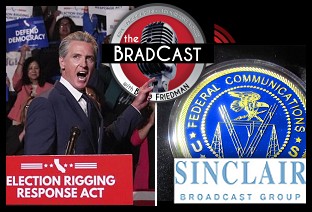 Newsom's 'Election Rigging Response Act'; FCC's License Renewal for Sock-Puppeting Sinclair: 'BradCast' 8/14/25
Newsom's 'Election Rigging Response Act'; FCC's License Renewal for Sock-Puppeting Sinclair: 'BradCast' 8/14/25 'Green News Report' 8/14/25
'Green News Report' 8/14/25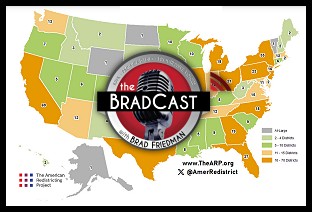 140 New House Reps?: Moving Beyond the Gerrymandering Wars: 'BradCast' 8/13/25
140 New House Reps?: Moving Beyond the Gerrymandering Wars: 'BradCast' 8/13/25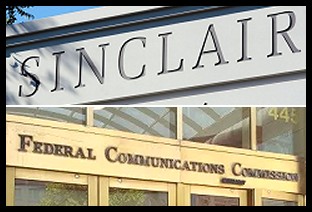 FCC Renews Sinclair TV Licenses Despite Complaint from Petitioner Who Died Waiting
FCC Renews Sinclair TV Licenses Despite Complaint from Petitioner Who Died Waiting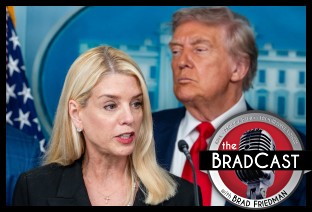 It's Not About the Rule of Law, It's About Authoritarian Control: 'BradCast' 8/12/25
It's Not About the Rule of Law, It's About Authoritarian Control: 'BradCast' 8/12/25 'Green News Report' 8/12/25
'Green News Report' 8/12/25 After Vaccine Cancels, CDC Shooting, Former Officials Want RFK Out: 'BradCast' 8/11/25
After Vaccine Cancels, CDC Shooting, Former Officials Want RFK Out: 'BradCast' 8/11/25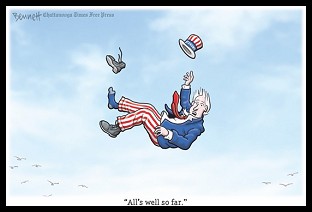 Sunday 'All's Well' Toons
Sunday 'All's Well' Toons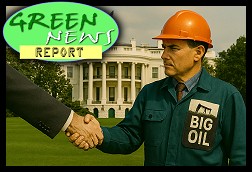 'Green News Report' 8/7/25
'Green News Report' 8/7/25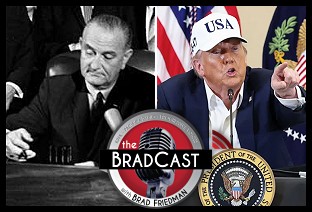 Trump Wars Against Greem Energy, Democracy on VRA's 60th: 'BradCast' 8/7
Trump Wars Against Greem Energy, Democracy on VRA's 60th: 'BradCast' 8/7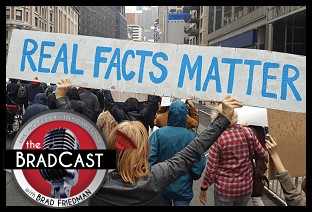 Media Conglomerates Continue Trump Capitulation: 'BradCast' 8/6/25
Media Conglomerates Continue Trump Capitulation: 'BradCast' 8/6/25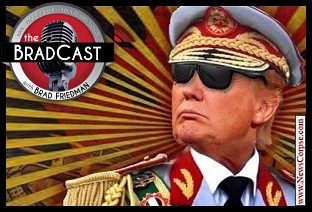 Banana Republican: Trump Shoots the Labor Statistics Messenger: 'BradCast' 8/5/25
Banana Republican: Trump Shoots the Labor Statistics Messenger: 'BradCast' 8/5/25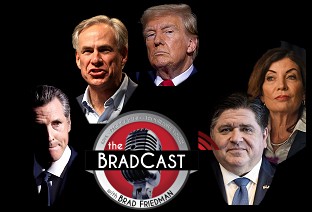 All's Fair in Love, War and, Apparently, Part-isan Gerrymandering: 'BradCast' 8/4/25
All's Fair in Love, War and, Apparently, Part-isan Gerrymandering: 'BradCast' 8/4/25 The Art of the Corrupt, Phony, Unlawful, Pretend Trade Deal: 'BradCast' 7/31/25
The Art of the Corrupt, Phony, Unlawful, Pretend Trade Deal: 'BradCast' 7/31/25 Battle Begins Against Trump EPA Climate Regulations 'Kill Shot': 'BradCast' 7/30/25
Battle Begins Against Trump EPA Climate Regulations 'Kill Shot': 'BradCast' 7/30/25 A Pu Pu Platter of Trump Corruption: 'BradCast' 7/29/25
A Pu Pu Platter of Trump Corruption: 'BradCast' 7/29/25 'Catastrophic' GOP Cuts to Medicaid, Medicare, ACA: 'BradCast' 7/28/25
'Catastrophic' GOP Cuts to Medicaid, Medicare, ACA: 'BradCast' 7/28/25
 VA GOP VOTER REG FRAUDSTER OFF HOOK
VA GOP VOTER REG FRAUDSTER OFF HOOK Criminal GOP Voter Registration Fraud Probe Expanding in VA
Criminal GOP Voter Registration Fraud Probe Expanding in VA DOJ PROBE SOUGHT AFTER VA ARREST
DOJ PROBE SOUGHT AFTER VA ARREST Arrest in VA: GOP Voter Reg Scandal Widens
Arrest in VA: GOP Voter Reg Scandal Widens ALL TOGETHER: ROVE, SPROUL, KOCHS, RNC
ALL TOGETHER: ROVE, SPROUL, KOCHS, RNC LATimes: RNC's 'Fired' Sproul Working for Repubs in 'as Many as 30 States'
LATimes: RNC's 'Fired' Sproul Working for Repubs in 'as Many as 30 States' 'Fired' Sproul Group 'Cloned', Still Working for Republicans in At Least 10 States
'Fired' Sproul Group 'Cloned', Still Working for Republicans in At Least 10 States FINALLY: FOX ON GOP REG FRAUD SCANDAL
FINALLY: FOX ON GOP REG FRAUD SCANDAL COLORADO FOLLOWS FLORIDA WITH GOP CRIMINAL INVESTIGATION
COLORADO FOLLOWS FLORIDA WITH GOP CRIMINAL INVESTIGATION CRIMINAL PROBE LAUNCHED INTO GOP VOTER REGISTRATION FRAUD SCANDAL IN FL
CRIMINAL PROBE LAUNCHED INTO GOP VOTER REGISTRATION FRAUD SCANDAL IN FL Brad Breaks PA Photo ID & GOP Registration Fraud Scandal News on Hartmann TV
Brad Breaks PA Photo ID & GOP Registration Fraud Scandal News on Hartmann TV  CAUGHT ON TAPE: COORDINATED NATIONWIDE GOP VOTER REG SCAM
CAUGHT ON TAPE: COORDINATED NATIONWIDE GOP VOTER REG SCAM CRIMINAL ELECTION FRAUD COMPLAINT FILED AGAINST GOP 'FRAUD' FIRM
CRIMINAL ELECTION FRAUD COMPLAINT FILED AGAINST GOP 'FRAUD' FIRM RICK SCOTT GETS ROLLED IN GOP REGISTRATION FRAUD SCANDAL
RICK SCOTT GETS ROLLED IN GOP REGISTRATION FRAUD SCANDAL VIDEO: Brad Breaks GOP Reg Fraud Scandal on Hartmann TV
VIDEO: Brad Breaks GOP Reg Fraud Scandal on Hartmann TV RNC FIRES NATIONAL VOTER REGISTRATION FIRM FOR FRAUD
RNC FIRES NATIONAL VOTER REGISTRATION FIRM FOR FRAUD EXCLUSIVE: Intvw w/ FL Official Who First Discovered GOP Reg Fraud
EXCLUSIVE: Intvw w/ FL Official Who First Discovered GOP Reg Fraud GOP REGISTRATION FRAUD FOUND IN FL
GOP REGISTRATION FRAUD FOUND IN FL

































